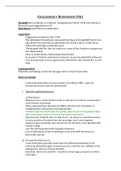GUGGENHEIM V ROSENBAUM 1961
Plaintiff: Born in Berlin, no relatives, immigrated to USA in 1939, married then
divorced, met Guggenheim in NY
Defendant: South African stockbroker
Legal facts
- Guggenheim resided in New York
- The defendant, Rosenbaum, proposed marriage to the plaintiff and it was
agreed after the plaintiff accepted that she would come to South Africa
where the marriage would take place
- The plaintiff sold her flat, her motorcar, some of her furniture and gave up
her employment
- Once in South Africa, relationship deteriorated
- In march of 1960, the defendant refused to marry the plaintiff and denied
ever having made such an agreement (claimed he only wanted her to visit
him)
Legal question
Plaintiff is instituting a claim for damages due to breach of promise
Ratio decidendi
- Court found that there are two actions according to RDL: claim for
patrimonial losses and non-patrimonial
1. Claim for patrimonial loses
a) Real losses
- Monetary loss a party had incurred or will incur as a direct consequence
of the breach of promise
- These expenses have become worthless after breach of promise i.e.
wedding dress, honeymoon accommodation
- Positive interesse instituted: the parties must be put in the position that
they would have been in if not for the breach of promise
- Expenses she claimed: loss on sale of car – no losses as would have been
in same position if entered into the marriage, but if used negative
interesse then would not have incurred cost. On facts, court decided that
couldn’t claim.
- Loss for stored goods in NY: negative interesse
- Loss of apartment & loss of earnings: court uses both interesses to
determine amount
b) Prospective/future loss
- Court found that plaintiff would have benefitted substantially from
marrying defendant (gifts, maintenance etc.) and she was entitled to the
damages for the loss of these benefits
- Quantum: factors to consider – duration of marriage, prospects of other
marriages
, - Positive interesse followed
NB: engagement is a contract sui generis so principles of positive interesse cannot
be applied unconditionally
2. Damages for infringement on personality right (non-patrimonial)
- Satisfaction: prove iuria – guilty party meant to hurt the feelings of other
party – courts discretion
- In casu, defendant simply denied existence of engagement + conduct
towards the plaintiff = iniuria
Courts decision
- Court found in favour of the plaintiff





